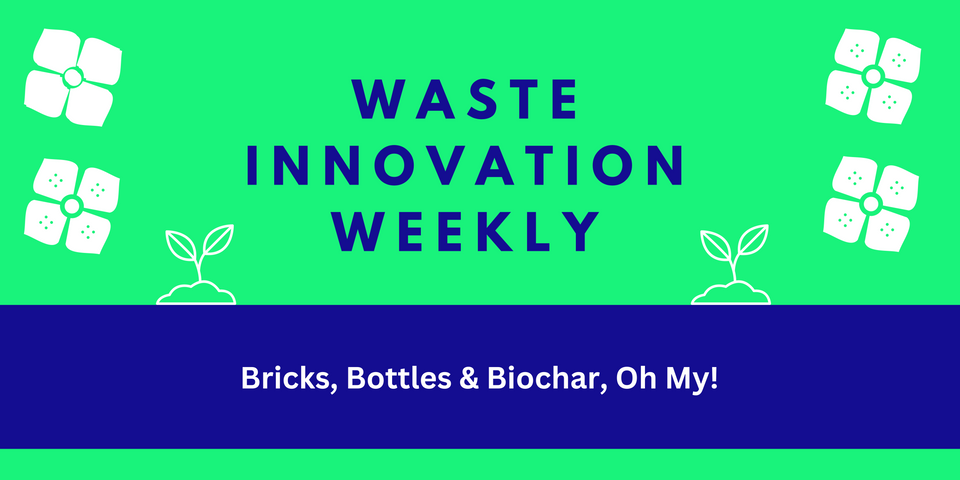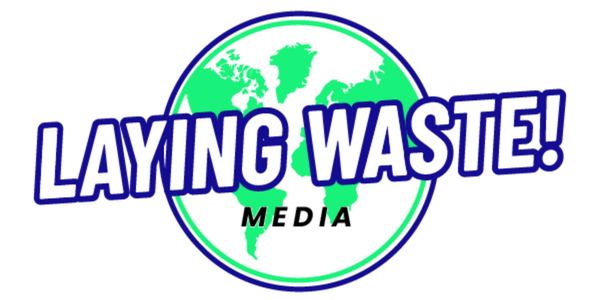This Week In Waste: Bricks, Bottles & Biochar, Oh My!

Hi everyone,
It was a scorching start to October, a warm 37 degrees here in Camden, Western Sydney. So I decided to spend Monday indoors producing the podcast edition of our weekly newsletter called What's Up In Waste.
🎙️ If you'd prefer to listen to a 3-minute recap, it's now available on Apple Podcasts, Spotify and our website.
Next up for this month's feature focus, we're going to be shining the spotlight on a big question:
As we shift towards a more sustainable future, does Australia have the workforce and skills to back it up? It's all about the green skills gap and it is sparking some heated debates.
In the US, President Biden launched the Climate Corps last month, an initiative to recruit 20,000 young people into environmental gigs. Is this something that we should be doing here in Australia?
If you want the full lowdown as we investigate this story and more, subscribe to our weekly email newsletter.
Till next week, stay cool.
Jane & Team Laying Waste Media
👇 And now, onto this week's recap: Bricks, Bottles & Biochar.
💡 Waste Innovation Spotlight
Biochar, the product of heating organic waste like wood or plants in an oxygen-deprived environment, is capturing global attention for its environmental potential.
Not only can biochar store carbon for centuries, but its diverse applications—from enriching soils to being incorporated in roads and concrete—are opening new avenues for sustainable development.
With the US and EU markets embracing biochar and corporations showing interest in related carbon credits, the material promises both environmental benefits and economic opportunities.
ANZ Biochar Industry Group experts shed light on these insights and more in a fascinating webinar hosted by the WMRR.
🌱 Our subscriber feature, From Waste to Worth: The Science of Biochar & Beyond, also explores the tech transforming waste into valuable resources and energy.
🚀 Are you a waste innovator? Contact us if you want to be featured on our upcoming podcast interview series or email newsletter.
Get your mission in front of investors, businesses, partners and organisations worldwide who want to make a positive impact.
🔆 Weekly News Picks
01/ The UN Environment Programme announces the historic decision to establish a "Global Framework on Chemicals – For a planet free of harm from chemicals and waste."
Based on 28 targets, the framework outlines a roadmap for countries and stakeholders to collaboratively address the lifecycle of chemicals, including products and waste.
It's a historic outcome of discussions at The Fifth International Conference on Chemicals Management (ICCM5), which concluded in Bonn last week.
Key directives include:
- The prevention of illegal chemical trade.
- Phasing out hazardous pesticides by 2035.
- Transitioning to safer chemical alternatives.
- Improved transparency.
The framework elevates the issue of chemical pollution to the same urgency as climate change and biodiversity loss. Germany has pledged EUR 20 million to fund its implementation. Read more here.
02/ 🧱 In an example of the challenges of product innovation, last week, LEGO shared they are pausing work on a prototype material sourced from recycled plastic.
After two years of testing and development on rPET, they've assessed that the rollout of this particular project, unfortunately wouldn't have helped to reduce overall carbon emissions. So they are moving on and testing alternatives. LEGO have tested more than 300 types of materials and there have been some successes with a material called bio-PE, which is derived from sugarcane. This is used in all of the little plant and botanical elements in the Lego sets. You can read more about their sustainability initiatives and progress here.
[On a side note, I had an idea for LEGO - how about an old brick return and earn program? Is there a way that we could send in our old bricks for reuse? I would be a millionaire]
03/ 🍅 Meanwhile, in the UK, Heinz is topping their squeezy tomato ketchup bottles with a 100% recyclable cap, making the whole bottle recyclable.
This means up to 300 million plastic caps could be recycled each year instead of being sent to landfill.
The cap is made from a 'first of its kind' material, designed to be compatible with kerbside recycling schemes.
It's launching UK-wide from next month. Let's hope this goes worldwide. Read more here.
📌 Bid Bulletin
- Do you have a great idea on how to use AI to improve recycling and help the environment?
Bankstown City Council is hosting market-sounding sessions and seeking like-minded organisations and developers to discuss AI recycling contamination models. More info here
📖 Book Of The Week
Deep Work: Rules for Focused Success in a Distracted World by Cal Newport.
How do you find the time? That is a question I was asked last week. One book that helped me a few years back when everything was getting a bit overwhelming was this one on time blocking. Basically, you block out each hour of your work day and put boundaries around focus tasks (for example, writing or analysing a report) and admin tasks like checking emails. There's no fancy app or diary needed: just a pencil/pen and a lined notebook. I found it super helpful and hope you do, too.
🌱 Fun Thing Of The Week
Did you know biochar has been found in ancient Amazonian soil which is known to be very fertile, the dark earths are called Terra preta.
🎙️ Stay Tuned
Discover an all new show What's Up In Waste - now on Apple Podcasts

